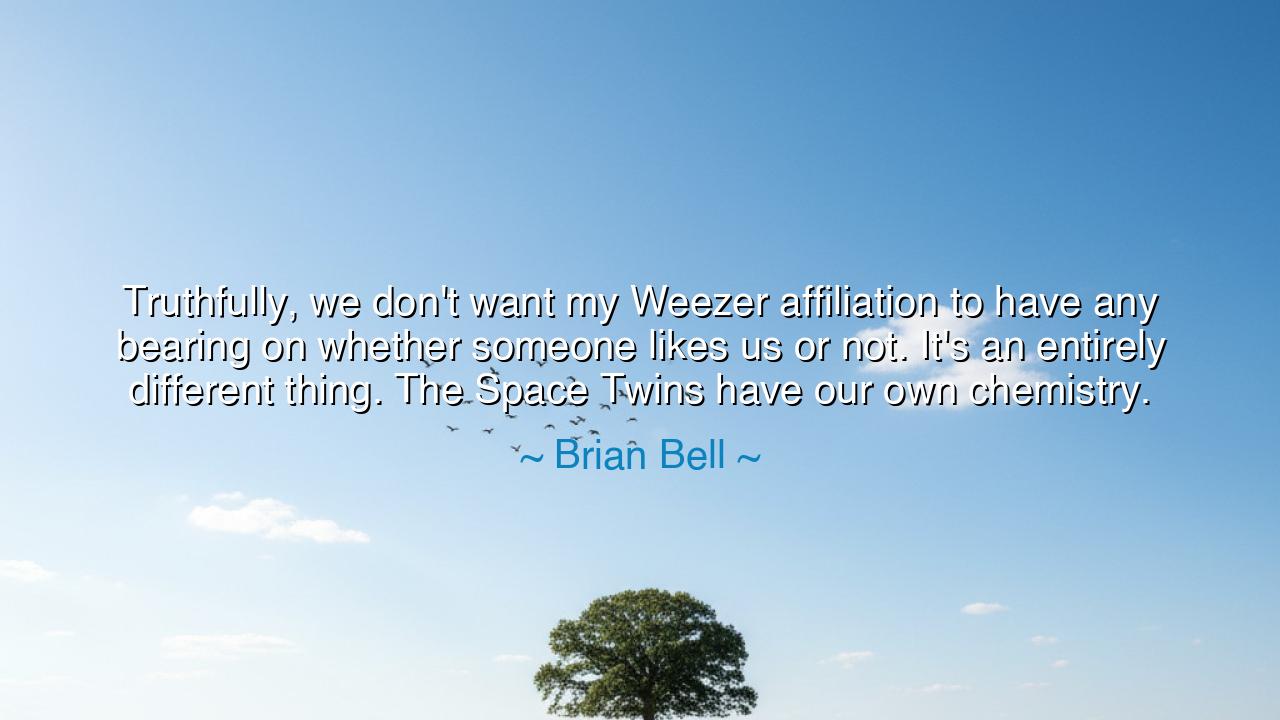
Truthfully, we don't want my Weezer affiliation to have any
Truthfully, we don't want my Weezer affiliation to have any bearing on whether someone likes us or not. It's an entirely different thing. The Space Twins have our own chemistry.






"Truthfully, we don't want my Weezer affiliation to have any bearing on whether someone likes us or not. It's an entirely different thing. The Space Twins have our own chemistry." These words, spoken by Brian Bell, carry a powerful message about the nature of identity, authenticity, and the strength of individuality within a greater collective. Here, Bell speaks not only to the separation of personal affiliation but to the independence and unique essence that can exist even within the context of broader influences. It is a lesson in self-definition, the kind that transcends the shadows of past associations and insists that true identity is forged in the fires of one's own creativity and vision.
In the world of music, where the soul is often bound to the identity of the group, it is all too easy for one’s personal contributions to be defined by the larger entity they belong to. Consider the ancient artisans—the sculptors and painters whose creations were often attributed to the masters who commissioned them. Yet, even within this framework of association, the individual artist's mark could not be erased. The great Michelangelo, for instance, may have worked under the patronage of the Medici, but the true essence of his work was his own, a reflection of his vision, his mastery, his unique soul. So too does Brian Bell wish to convey that, despite his affiliation with Weezer, the creative force behind the Space Twins is distinct—an identity that should stand independent and proud, free from the shadow of previous successes.
What Bell expresses here is a fundamental truth about the human experience—that no matter where we come from, no matter the weight of our past, we each have the capacity to create something new, something that belongs only to us. The Space Twins, as Bell declares, have their own chemistry, a bond formed from shared purpose and collective creativity, but also rooted in the individuality of each member. This idea of chemistry reflects not just a physical connection, but a spiritual one—an alignment of souls, a unity that is unique and irreducible. It is a powerful reminder that, though we may be part of something larger, our contributions and creations are still ours to define.
Consider the story of Leonardo da Vinci, whose genius transcended the art commissions he received. Though he worked for various patrons, including the powerful Lorenzo de' Medici, da Vinci’s art and inventions remain a testament to his personal vision. Even in the collaborative world of the Renaissance, where artists were often defined by their associations, Leonardo’s work stands apart—not merely as a product of his patron, but as a reflection of his inner self. So, too, does Bell’s work with The Space Twins reflect his own artistry, his own chemistry, separate from the identity he had with Weezer. His creative force is not to be diminished by past affiliations, for it is the present and the future of his work that matter most.
This lesson calls upon us to consider how we define ourselves. In a world where so much is shaped by external labels—whether it be the family we come from, the company we keep, or the places we have worked—how much of our essence is truly our own? The ancients knew the importance of self-definition. Socrates famously said, “Know thyself.” To know oneself is not to be confined by the circumstances of one’s birth or the influences that have shaped us, but to recognize that within us lies a unique creative force, one that is independent and free. Brian Bell’s words are an echo of this ancient wisdom, a call for each of us to stand apart and create anew—to forge our own path and define our own legacy, unencumbered by the shadows of the past.
The wisdom Bell imparts is also a reflection on the power of authenticity. When we allow ourselves to be defined solely by our past affiliations or achievements, we risk losing the very essence of who we are. Just as Bell seeks to have The Space Twins recognized for their own distinctiveness, we, too, must ensure that our actions, our art, and our legacies are shaped by our current selves, not merely by the roles we have played in the past. To show up in the world as our authentic selves is not just a gift to us, but a gift to the world, for in doing so, we invite others to do the same.
Thus, take this lesson to heart: Let not your past affiliations define you. You are more than the sum of your past accomplishments, and you are more than the roles you have played. Like Brian Bell, take pride in the chemistry you share with those who walk alongside you, but also remember that your individual essence—your true, authentic self—cannot be tied to the history of another. Step forward and create in the moment, for it is in the present that we have the power to shape our future. Do not be bound by what you have done, but rise to meet the person you are becoming. Your true self is waiting to be expressed, and only by embracing it fully can you truly create something that belongs to you alone.






AAdministratorAdministrator
Welcome, honored guests. Please leave a comment, we will respond soon